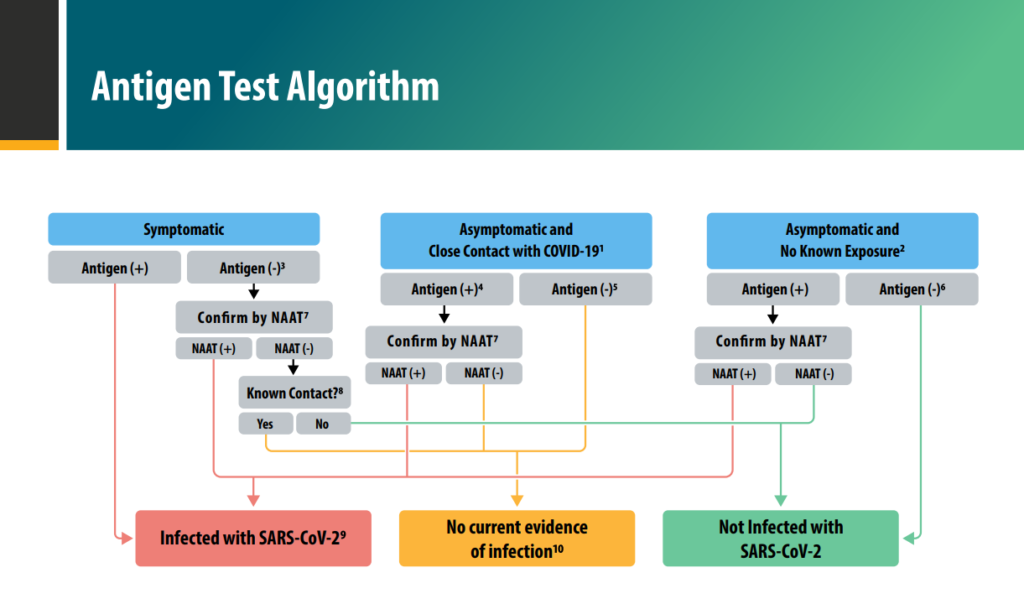Q: Are there good resources out there?”
A: Yes! With people heading back to school and work and increasing risks of exposure, this is an important question. It is important to test at the right time, with the right test, and as often as needed.
Before we dive in, here are a few details. Remember that PCR tests (or molecular tests) are the gold standard. They detect the viral genome. Antigen tests detect proteins on the surface of the virus.
Both are considered diagnostic tests (See here for our previous post on testing.). PCR tests are the gold standard in testing; but rapid tests can be helpful to determine if further testing is needed. Rapid tests are cheaper and faster. Specific situations may determine when one or the other may be helpful.
🙋 When should I get tested?
It is clear that you should get tested if: 1) You are directly exposed to someone who has symptoms of COVID-19 and/or is not symptomatic when you were with them but later develops symptoms;
2) You have attended an event or were in a higher risk setting such as a crowded indoor setting (test 3-5 days after the event); 3) You are in a situation where you need routine screening (like school or the NBA).
It is not as clear, but probably important to get tested if: 1) You will be in a situation where you are around lots of other people and it is important to know if you have COVID-19 (like before a gathering); 2) Before and after travel; 3) Before visiting people. If you are asymptomatic, you will likely test negative in these scenarios, especially if using an antigen test.
❓ When should I use an at home antigen test?
At home testing can be helpful when 1) You need a result quickly; 2) You don’t have a prescription for a test; 3) You want to determine if you need to isolate; 4) You want a result for one of the above scenarios.
At home tests are antigen tests. A list of at home FDA approved tests is here. Costs for tests vary, for example the BinaxNow test costs about $25 for two tests! This could get expensive if you are planning to do these often!

❓ When should I get a PCR test?
A PCR test (the one that gets sent to the lab) should be done in the following situations:
1-If you have symptoms, but your rapid test was negative.
2-To confirm a positive rapid test if you are asymptomatic and had close contact exposure (but you should still follow appropriate isolation guidelines if symptomatic and quarantine guidelines if asymptomatic but positive)
3-To confirm a positive rapid test if you are asymptomatic and had no known exposure (again, still follow appropriate isolation or quarantine guidelines).
❓ What are the differences?
There are a few differences.
➡️ PCR tests and some antigen tests may require a healthcare provider order. Testing sites are also available and can be searched in your locality through your local department of public health. At home tests can often be purchased at retail pharmacies.
➡️ PCR tests can be taken from the back of the nose/throat (nasopharyngeal swab, that REALLY long Qtip) OR from a shallow swab. They must be analyzed in the lab. Rapid antigen test samples are taken from the nose or mouth (more like a Qtip type swab) and can be analyzed either at home or in the lab.
➡️ PCR test results are quite accurate. Rapid antigen tests should be confirmed in most cases with a PCR test. There is a risk for false negative results. (a negative test result when the person is really positive. See our previous post for a little more on this.)
➡️ PCR test samples cannot be done at home. Antigen tests can (see the above link for available tests).
➡️ PCR test results can take up to a few days (but can be turned within 24 hours depending on your testing facility). Antigen tests can yield results quickly (some can give results right when you take them and some are sent to the lab, depending on where you have it done-at home test kit or send out)
❓ What are the purposes of each one?
☝️ PCR tests are important to confirm the presence of SARS CoV-2. They are accurate, but won’t give fast results.
☝️ Antigen tests are important when you need to know if you are positive quickly. They are not as accurate as PCR tests and often need to be followed up with a PCR test.
🏫 What about testing for children?
Some parents have considered testing their children while in school (if schools are not doing so or have fewer control strategies in place). Our contributing writer Dr. Chana Davis was recently interviewed about this at Slate.com. The takeaways: One point of testing is not enough and at home tests would need to be repeated to be useful in situations when children are asymptomatic. In addition, these tests may be less useful in children, mainly because they are often asymptomatic (and so have lower viral loads). Finally, costs can add up, although some cities (such as DC) are offering tests for free. (Read the full article here.)
The takeaway: Rapid tests can be useful if used appropriately. PCR tests are often needed to confirm diagnosis.*
Stay safe. Stay Sane.
With Love,
Those Nerdy Girls
*One more thing to emphasize, testing does not replace other strategies. Ensuring adequate spacing (6 feet), masking, seeing people outside or improving ventilation, limiting circles of friends/groups/contacts, limiting time of contact with others, and getting vaccinated when eligible will all remain important to control the spread of SARS CoV-2.
Additional Resources:
American Academy of Pediatrics Testing Guidelines
Overview of Rapid Testing from the ID Society
Previous Post on Rapid Testing
Previous Post on Timeline of Exposure to Shedding to Viral Symptoms
Previous Post on When to Get Tested
Credit for Image (Antigen Testing Algorithm)


